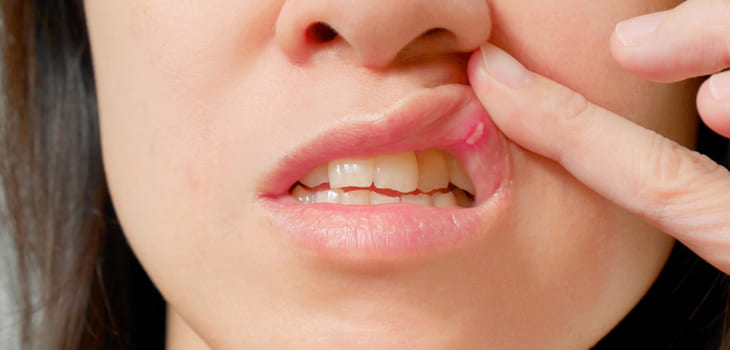Mouth ulcers, also known as canker sores, are small, painful lesions that develop on the mucous membranes inside the mouth. They can cause significant discomfort, especially when eating, drinking, or talking. While mouth ulcers are generally harmless and tend to heal on their own, they can sometimes be indicative of underlying health issues. This article delves into the common causes of mouth ulcers, available treatments, and dietary recommendations to avoid exacerbating the condition.
What is a Mouth Ulcer?
A mouth ulcer is a sore that appears on the soft tissues of the mouth, including the inner cheeks, lips, tongue, floor, and roof of the mouth. These ulcers are typically round or oval with a white, yellow, or red center and a red border. They can vary in size and severity, ranging from minor irritations to more severe and recurring sores.
Common Causes of Mouth Ulcers:
- Injury or Trauma:
- Biting the inside of the cheek, wearing ill-fitting dental appliances, or brushing teeth too vigorously can cause mouth ulcers.
- Nutritional Deficiencies:
- Lack of essential nutrients such as vitamin B12, iron, folic acid, and zinc can lead to the development of mouth ulcers.
- Stress and Hormonal Changes:
- Emotional stress and hormonal fluctuations, particularly in women, can trigger mouth ulcers.
- Food Sensitivities:
- Certain foods, including acidic fruits, spicy foods, and nuts, can cause irritation and lead to ulcers in sensitive individuals.
- Medical Conditions:
- Conditions such as celiac disease, Crohn’s disease, Behçet’s disease, and a weakened immune system are associated with recurring mouth ulcers.
- Allergic Reactions:
- Allergies to food or dental products, such as toothpaste and mouthwash containing sodium lauryl sulfate, can cause ulcers.
- Infections:
- Viral infections, including herpes simplex virus, can cause mouth ulcers.
Treatment for Mouth Ulcers:
- Topical Treatments:
- Over-the-counter gels, creams, and ointments containing ingredients like benzocaine, hydrocortisone, or lidocaine can help numb the pain and speed up healing.
- Mouth Rinses:
- Antimicrobial mouth rinses or saline water can help reduce inflammation and prevent infection.
- Oral Medications:
- In cases of severe or recurrent ulcers, a doctor may prescribe oral medications such as corticosteroids or immune-modulating drugs.
- Home Remedies:
- Applying a paste of baking soda and water, dabbing with hydrogen peroxide, or rinsing with a solution of saltwater can provide relief.
- Nutritional Supplements:
- Taking supplements to address deficiencies in vitamins B12, iron, folic acid, or zinc can help prevent and treat ulcers.
Foods to Avoid with Mouth Ulcers:
- Spicy Foods:
- Foods containing hot peppers and spices can irritate the sores and worsen the pain.
- Acidic Foods:
- Citrus fruits (oranges, lemons, grapefruits), tomatoes, and vinegar-based foods can exacerbate ulcers.
- Salty Snacks:
- Potato chips, pretzels, and other salty snacks can cause irritation and pain.
- Hard and Crunchy Foods:
- Nuts, toast, and hard crackers can scrape against the sores and prolong healing.
- Sugary Foods:
- High-sugar foods and drinks can contribute to the growth of bacteria and potentially cause secondary infections.
Foods to Eat for Soothing Mouth Ulcers:
- Dairy Products:
- Yogurt, milk, and cheese can provide a soothing effect and are gentle on the sores.
- Soft Foods:
- Foods like mashed potatoes, scrambled eggs, oatmeal, and smoothies are easy to eat and less likely to irritate the ulcers.
- Cold Foods and Drinks:
- Ice cream, frozen yogurt, and cold water can provide temporary pain relief and reduce inflammation.
- Nutrient-Rich Foods:
- Leafy greens, lean proteins, and whole grains help support overall health and healing.
Mouth ulcers, while typically not serious, can cause significant discomfort and affect daily activities. Understanding the common causes, treatments, and dietary adjustments can help manage and prevent these painful sores. If you experience frequent or severe mouth ulcers, it is important to consult a healthcare professional to rule out underlying conditions and receive appropriate treatment.
Stay tuned to DailyHawk for more health tips and updates on managing common ailments.


